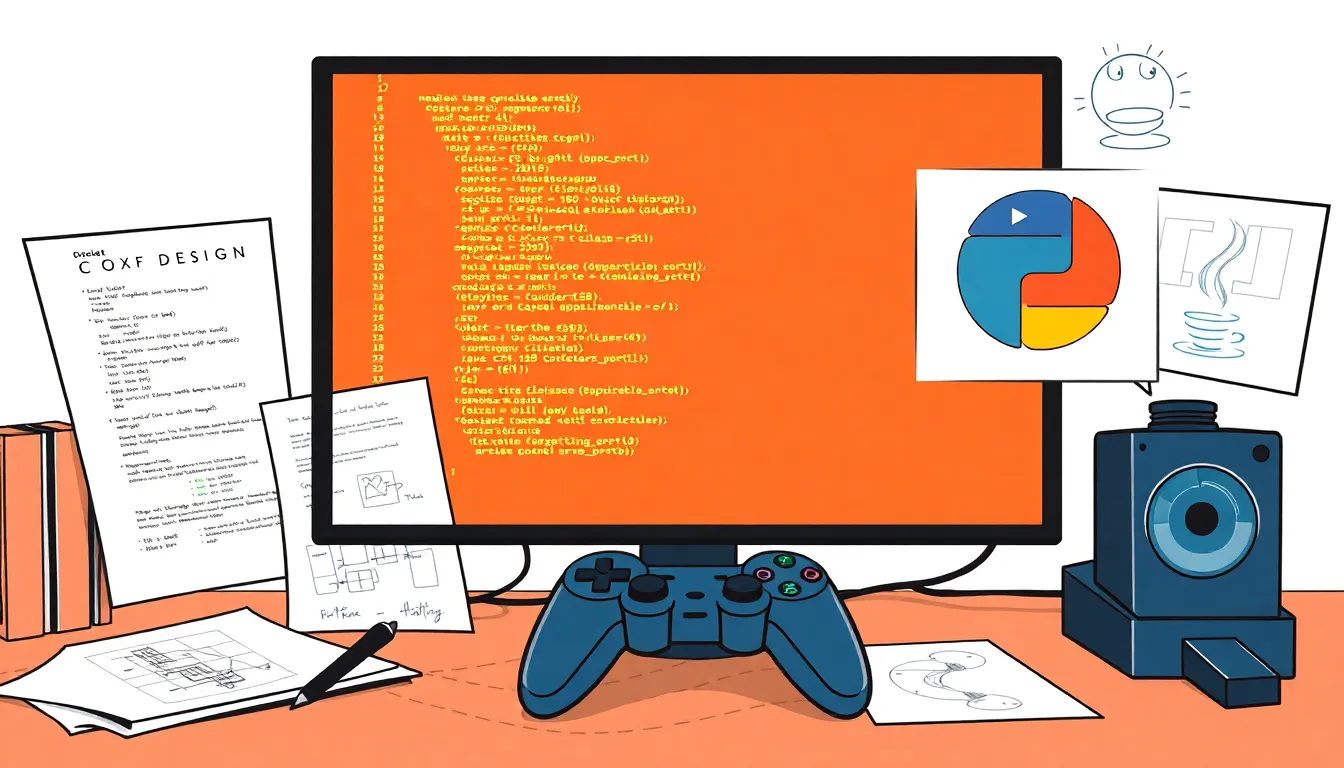In the vast universe of game development, choosing the right programming language can feel like picking the perfect pizza topping—everyone’s got an opinion, and it can get messy fast. Whether you’re crafting a pixelated indie masterpiece or a high-octane AAA blockbuster, the language you choose can make or break your gaming experience.
Best Programming Language For Game Development
Game development languages play a crucial role in crafting engaging experiences. Various languages serve distinct purposes, ranging from high-level scripting to low-level performance optimization. Developers often choose from a set of popular options based on project needs.
C++ stands out as a prominent choice due to its speed and efficiency. Many AAA titles utilize C++ for system-level programming, making it a preferred option for performance-intensive games. Unity supports C# as its primary language, offering an accessible entry point for newcomers and experienced developers alike.
JavaScript finds its place in web-based games, allowing interactivity within browsers. Developers leverage frameworks like Phaser or Three.js to create dynamic gaming experiences. Python, admired for its simplicity, is often used for prototyping and learning game development fundamentals.
Lua serves as a lightweight scripting language, frequently embedded in game engines such as Corona or Love2D. Its ease of integration and flexibility make it popular among indie developers. Swift is gaining traction in mobile game development, particularly for iOS applications.
Each language offers unique features that cater to specific types of projects. Choosing the right language directly influences a game’s performance, scalability, and user experience. The selection process involves considering project requirements, target platforms, and development teams’ expertise. Prioritizing these factors ensures a smoother development cycle and a successful final product.
Popular Programming Languages for Game Development

Several programming languages dominate game development, each suited for different types of projects and developers’ expertise.
C++
C++ excels in performance, making it a preferred choice for AAA game titles. It offers fine-tuned control over system resources, allowing developers to optimize graphics and gameplay efficiency. Various game engines, including Unreal Engine, leverage C++ for high-end performance. Its steep learning curve might deter beginners, yet experienced developers value its power and flexibility in complex projects.
C#
C# provides a user-friendly alternative for game development. It’s the primary language for Unity, one of the most popular game engines. Developers appreciate C# for its clarity and simplicity, which helps streamline the process for indie developers and newcomers alike. With C#, creating cross-platform games becomes accessible, making it a strong contender for both mobile and console platforms.
Java
Java supports game development, particularly for web-based games. Its write-once-run-anywhere capability appeals to developers targeting various platforms. Server-side applications benefit from Java’s efficiency, enabling players to connect seamlessly. Though not as common for high-performance games, its portability and extensive libraries provide valuable tools for developers focusing on browser games.
Python
Python stands out for prototyping and educational purposes in game development. Its straightforward syntax allows developers to focus on design rather than complex coding. Various libraries, such as Pygame, facilitate game development, enabling quick iteration and testing. While it may not match C++ for performance, powerful game concepts can still be rapidly developed using Python, making it an ideal choice for beginners.
Factors to Consider When Choosing a Language
Choosing a programming language involves evaluating several critical factors that impact game development. Making the right choice enhances a game’s overall performance, community interaction, and ease of learning for developers.
Performance
Performance serves as a vital consideration in game languages. Speed and memory efficiency are crucial, especially for complex graphics and real-time interactions. C++, with its low-level capabilities, excels in demanding projects, delivering high performance essential for AAA games. Alternatively, scripting languages like C# and Lua may trade off speed for faster development cycles, making them suitable for indie projects. Ensuring the language meets the requirements of the game’s graphics engine further influences the decision.
Community Support
Community support plays a significant role in the language selection process. A strong developer community provides access to resources, tutorials, and forums for troubleshooting. C# and Python benefit from extensive communities, attracting new developers with ample online resources. Additionally, a language’s popularity often correlates with better third-party libraries, facilitating a smoother development process. Choosing a widely supported language can accelerate problem-solving and enhance collaboration among developers.
Learning Curve
The learning curve affects how quickly developers can become proficient in a chosen language. Languages like Python feature simple syntax that allows beginners to grasp concepts swiftly. C#, while user-friendly, may require more time to master. In contrast, C++ demands a deeper understanding of programming fundamentals, posing challenges for newcomers. Evaluating the team’s experience and familiarity with the language impacts project timelines and overall productivity. Prioritizing accessible languages may yield faster results and reduce onboarding times for new team members.
Conclusion
Choosing the right programming language for game development can make or break a project. Each language brings its own strengths and weaknesses that align with specific needs and goals. Developers should weigh factors like performance requirements and community support against their team’s expertise and the intended platform.
Whether it’s the speed of C++ for AAA games or the accessibility of Python for prototyping, understanding these nuances empowers developers to create engaging and high-quality gaming experiences. By making informed choices, they can set their projects up for success and deliver games that resonate with players.


